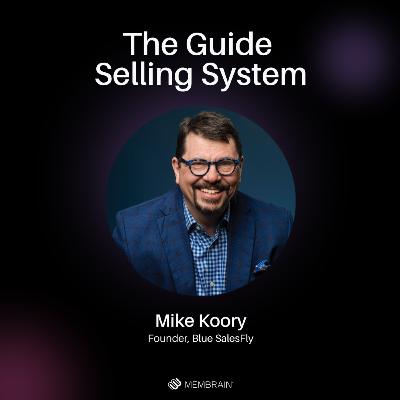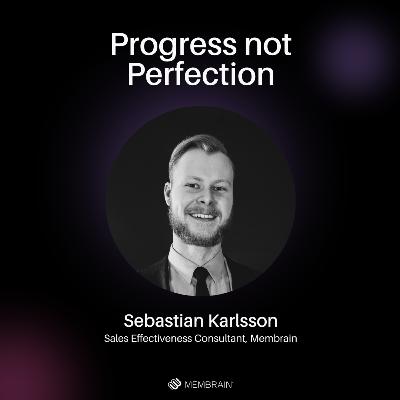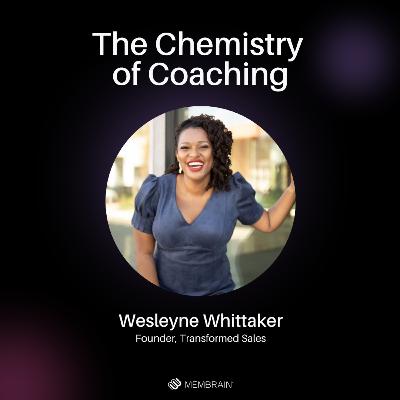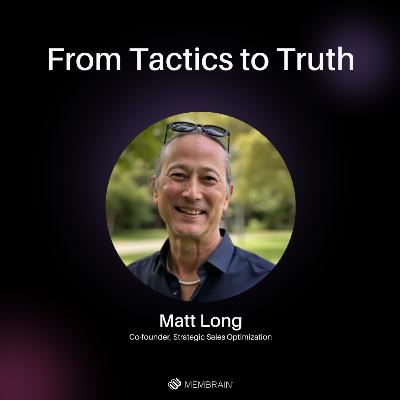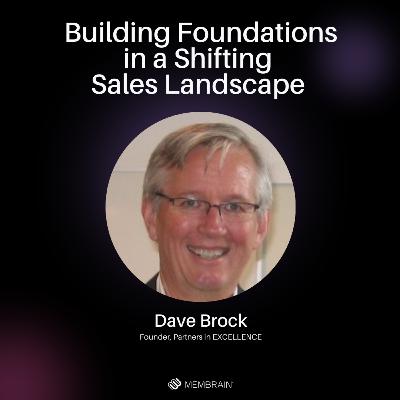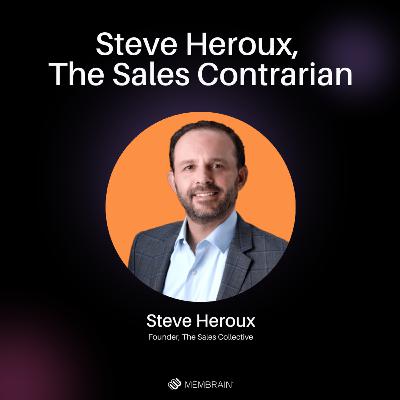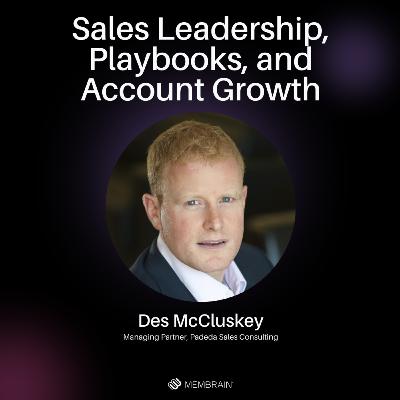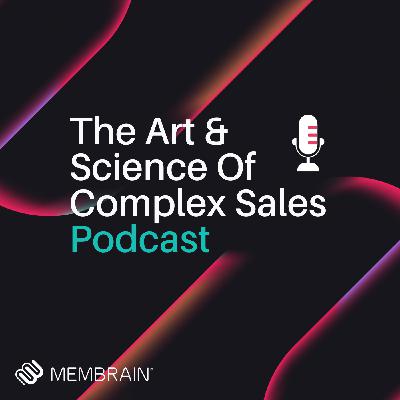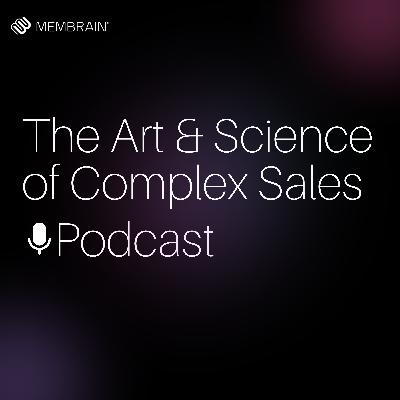Discover Art & Science of Complex Sales
Art & Science of Complex Sales

136 Episodes
Reverse
In this episode of The Art and Science of Complex Sales, Paul Fuller is joined by Kelly Riggs, sales performance coach and founder of The Business LockerRoom. They dig into the realities of leadership, coaching, accountability, and why many sales teams fail to reach their full potential. Kelly challenges conventional thinking and offers practical guidance for creating stronger, more effective sales cultures.The Biggest Lie Sales Managers Tell Themselves (01:32)Kelly reveals that one of the most damaging beliefs among sales leaders is "I don't have time." He explains that many managers carry an efficiency mindset from their days as top performers, believing they can juggle development alongside administrative tasks. However, real leadership demands an intentional shift in time investment. Coaching cannot be rushed. To lead effectively, managers must step away from task juggling and prioritize one-on-one development, even if it feels inefficient.Accountability is a System, Not a Personality Trait (10:18)Kelly emphasizes that accountability does not stem from personality alone but from structured leadership systems. Many organizations hope to hire self-accountable reps and avoid the hard work of coaching. This rarely works. Accountability must be built into the culture by leaders who understand their role in reinforcing it. He notes that when managers create clarity, support, and regular coaching rhythms, accountability becomes a shared standard rather than a punitive concept.The Hidden Cost of Keeping Toxic High Performers (18:17)Kelly outlines the steep cultural and operational costs of retaining top sellers who undermine team morale. These individuals often hold leadership hostage by leveraging their revenue contributions. Kelly warns that while letting them go can feel risky, keeping them signals to the rest of the team that toxic behavior is acceptable. The result is a deteriorating culture, operational bottlenecks, and lost A-players. Leaders must confront this behavior early and decide whether the person can adapt or needs to exit.Sales Hiring and Team Design in the AI Era (23:46)Despite the rise of AI and automation, Kelly argues that the fundamentals of sales team design remain consistent. Tools can augment performance, but they cannot replace the core human aspects of sales. Selling is still about guiding buyers through complexity, building trust, and influencing decisions. Organizations that rely solely on tools without training for emotional intelligence, adaptability, and buyer alignment will fall behind. Salespeople are needed more than ever—not less.
In this episode, Paul Fuller is joined by Mike Koory, founder & CEO of Blue SalesFly, to talk about his new book, The Guide Selling System. Mike shares how traditional sales tactics often miss the mark by focusing on persuasion rather than understanding. His system encourages salespeople to act as guides, helping customers move from where they are to where they want to be.Mike introduces the idea of using a structured, systems-based approach in sales, inspired by quality practices from other industries. He emphasizes the importance of asking better questions, building trust, and shifting the mindset from selling to guiding.He also talks about “TOPO map”, which focuses on Threats, Obstacles, Problems, and Opportunities as a way to reframe discovery and create more meaningful conversations. The discussion highlights how real change in sales happens not through high-pressure tactics, but through clarity, consistency, and collaboration.
In this episode, Sebastian Karlsson, a Sales Effectiveness Consultant at Membrain, joins Paul Fuller on the podcast to discuss how small, consistent habits and clear processes can make a big difference in both hitting targets and building confidence. Seb explains why having a sales process is like having a checklist. It helps teams avoid repeating mistakes, scale beyond just one top performer, and stay focused. He shares a personal story about starting small with fitness and how that idea translates to improving in sales.He also talks about the uncomfortable but powerful habit of watching recordings of his own sales calls. For him, it’s the fastest way to improve.The conversation is all about making progress one step at a time, keeping things human, and learning how to enjoy the process.
In this episode of The Art and Science of Complex Sales, Paul Fuller is joined by Wesleyne Whittaker, founder of Transformed Sales, a former chemist turned international sales leader. The conversation unpacks what it means to transform sales teams from within, with a sharp focus on leadership accountability, mindset and skill-building, especially in the often-overlooked world of manufacturing and distribution sales.Wesleyne shares her journey from lab work to sales consultancy, revealing how her analytical background shaped a science-meets-art approach to solving sales challenges. She dives into the critical gaps in sales enablement within industrial sectors and shows how curiosity, mindset resilience and coaching cultures drive real performance improvement.With real-world examples including a powerful story of a leader who went from being on a performance plan to earning a spot at President’s Club, this episode challenges traditional views on sales training and emphasizes the deep, human work that goes into transforming a team.
In this episode of The Art and Science of Complex Sales Podcast, we’re joined by Matt Long, co-author of Winning Faster and co-founder of Strategic Sales Optimization. Together with host Paul Fuller, Matt shares the lessons from his 25-year journey through enterprise software sales and why structure, not improvisation, is what unlocks consistent success in complex deals.The Shift from Tactics to Strategy (06:41)Matt reflects on his evolution from a tactical sales engineer into a strategic partner in enterprise deals. He unpacks how technical roles often stay too focused on immediate tasks, and why stepping back to analyze the full sales motion is where real selling begins. This shift laid the foundation for everything he now teaches.Breaking Down the MOVE Framework (11:19)At the heart of Matt’s methodology is the MOVE Framework: Motive, Opportunity, Value, and Engagement. Each component helps sales teams bring structure to chaotic buying cycles. He breaks down how to discover true business motives, map power and influence, articulate differentiated values, and engage customers meaningfully through every interaction.Why Better Demos Mean Faster Wins (36:05)Matt explains how weak demos lead to excessive proof-of-concepts and lost deals. He shares how aligning demos with discovery and tailoring value to different power centers speeds up decision-making and improves close rates. It’s not about more features but about being more relevant.
In this episode of The Art and Science of Complex Sales, Paul Fuller chats with Brent Long about the mindset behind his new book The Greatest Sales Question Ever Asked. Brent shares how his personal approach to selling has evolved, and why honest, heart-led questions are the most powerful tool a salesperson can use.What Inspired The Greatest Sales Question Ever Asked (02:32)Brent reveals how the book was born from decades of coaching and a growing frustration with vague sales advice. Tired of hearing "ask better questions" without any clarity on what those questions were, Brent set out to define them. The book distills his years of field-tested coaching into a guide that helps salespeople build trust, ask with purpose, and sell without compromising who they are. It also reflects his personal faith and the belief that great salesmanship starts with truth and intention. Brent shares how the encouragement of clients and the challenge from his wife gave him the final push to complete the project, even when revisiting some difficult personal stories.From Tactics to Truth in Sales (07:13)Brent shares how his early career was driven by competitiveness and control. He was skilled enough to dominate conversations, win deals, and even manipulate people while still making them feel good about it. But over time, he began to feel the disconnect between performance and purpose. That turning point led him to rethink what success in sales really looks like. Instead of pursuing quick wins, he shifted toward serving others with genuine care. This part of the episode digs into the internal conflict many sellers face and how Brent reframed sales as an act of service rather than persuasion.The Three Truths of a Cold Call (11:57)In one of the most practical takeaways from the episode, Brent introduces his “Three Truths of a Cold Call” framework. Instead of using tricks or clever intros, Brent teaches salespeople to lead with honesty: acknowledge that it is a cold call, admit you might not be calling at the best time, and ask one thoughtful question. This opens the door to authentic conversations and lowers resistance. He shares how this approach has helped clients who were previously stuck break through with even the most resistant prospects. Brent also explains how truth-based selling builds long-term courage and confidence—paying salespeople with emotional momentum before any commission arrives.Brent's book can be found here.
In this episode of The Art and Science of Complex Sales, Paul Fuller sits down with Dave Brock, founder of Partners in EXCELLENCE. They unpack the challenges and contradictions facing modern sales teams—from cultural drift to leadership dysfunction—and explore what it really takes to build resilient, high-performing organizations in today’s environment.High Performers Play the Long Game (25:28)What do the best companies have in common? Dave shares lessons from top-performing organizations across industries. These teams focus on fundamentals, long-term leadership, and curiosity—not shortcuts. He emphasizes that sustained success is built on depth, not hacks or vanity metrics.High Performers Play the Long Game (25:28)What do the best companies have in common? Dave shares lessons from top-performing organizations across industries. These teams focus on fundamentals, long-term leadership, and curiosity—not shortcuts. He emphasizes that sustained success is built on depth, not hacks or vanity metrics.Rethinking Playbooks and Performance (36:59)Sales playbooks are helpful—but not when they become cages. Dave and Paul discuss how top reps use playbooks as foundations, not scripts. Real performance comes from learning, adapting, and thinking critically. They explore why flexibility, common language, and trust are more important than rigid rules in today’s complex sales environments.
In this episode of The Art and Science of Complex Sales, we’re joined by Tony Cross, CEO of Growth Matters International. Tony shares how sales managers can be the most powerful lever for sales transformation. The conversation focuses on how to lead teams through uncertainty, coach toward customer buying behavior, and create practical momentum through structured conversations and frameworks. Tony also introduces his "Chalk and Talk" initiative, a live, collaborative coaching experience designed to foster strategic action.Coaching Through Uncertainty (03:38)Tony explains how sales managers can cut through the noise by staying focused on the fundamentals. Rather than "getting back to basics," he advocates reinforcing foundational one-on-one coaching that helps reps guide customers through complex buying decisions. Uncertainty is high, but clarity can be created through strong leadership.Aligning with the Buying Process (06:08)The episode explores why sales teams need to understand how buying decisions are made inside customer organizations. Tony discusses using a draft buying vision to collaborate with buyers and ensure proposals speak to everyone involved, not just the primary contact. This approach builds trust and improves win rates.Pipeline Coaching with the ICE Model (15:55)Tony introduces the Identify, Clarify, Explore (ICE) model as a simple yet powerful framework for coaching reps on pipeline health. He explains how sales managers should move beyond metrics like coverage ratios and instead diagnose pipeline challenges by looking at value, volume, velocity, and deal shape.
Sales excellence starts with purpose, is driven by process, and grows through self-awareness. It’s about aligning personal motivation with meaningful business impact. Zack Bower and Nick Massaro from Membrain unpack what sales means to them, why process thinking matters, and how Membrain helps them sell with greater clarity and consistency. This episode blends introspection and practical insight to show how structure leads to better results for individuals, teams, and businesses alike.
Steve Heroux, the author of "The Sales Contrarian," joins us for an eye-opening chat about shaking up the sales world. Steve isn't just challenging tired sales norms—he’s flipping them on their head with his groundbreaking book that’s captured the attention of sales leaders and salespeople alike. He takes us behind the scenes of his unexpected bestseller, highlighting the role of leadership, or often the missteps of it, in shaping sales dynamics. With fascinating anecdotes, including a memorable shoutout to Daniel Pink, Steve spotlights the harmful perceptions surrounding sales professionals and argues passionately for a leadership shift to truly elevate the profession.Get a copy of the book here.
Join us as we explore the complexities of B2B sales with Des McCluskey, Managing Partner of Padeda and former Sales Director at Johnson & Johnson. Des shares practical insights on building effective sales playbooks, the critical role of first-line sales leaders, and navigating complex sales cycles. Drawing from experience in medical devices, professional services, and financial services, he provides actionable strategies on sales enablement, coaching, and account management that sales leaders can apply immediately.The Cultural Gap in Sales Playbooks (6:09)Des highlights a fundamental difference between American and European sales approaches. While U.S. teams embrace structured sales playbooks, modeled after football plays, European teams favor a more flexible, improvisational style inspired by soccer. This cultural contrast makes implementing playbooks a challenge in Europe, requiring a shift in mindset and execution.The Rise of Bureaucracy in Sales Processes (14:10)Des discusses how an increase in technical buying influences and complex procurement systems is slowing down deal closures. Even with verbal approval from decision-makers, deals are now delayed by an average of six weeks due to finance checks and system inefficiencies. This trend creates forecasting challenges for sales teams, emphasizing the need for more proactive post-approval management.The Power of Retention Squads (23:35)Des introduces “retention squads”—cross-functional teams dedicated to managing and growing existing accounts. Unlike traditional account management, these agile, project-based teams engage multiple stakeholders to maximize renewals and drive account expansion. By fostering deeper relationships and broader outreach, retention squads help organizations secure long-term growth and uncover new opportunities.
In this episode, Leslie Venetz founder of The Sales-Led GTM Agency joins us for a captivating discussion on her journey into the sales profession and her pivotal role in the Women Sales Experts Conference. Once viewing sales as merely a temporary gig, Leslie discovered her true passion when she embraced her ability to help people solve their problems.The Soul-Sucking Impact of Bad Data (10:04)Leslie discusses one of the biggest challenges sales teams face—poor data quality. She explains how bad data demoralizes sales reps, turning outreach into a frustrating and ineffective process. Leslie emphasizes that having accurate, enriched data combined with the right tech stack not only improves outreach success rates but also alleviates the mental fatigue caused by ineffective efforts.The Power of Signals in Sales Tech (14:04)Leslie highlights how modern sales tech has transformed outreach by leveraging signals—indicators like new hires, financial shifts, or market events. She explains that the true power lies in connecting these signals to build timely, relevant, and personalized outreach. By integrating these insights, sales teams can craft pitches that resonate with prospects' current challenges and priorities, making outreach significantly more effective.Discovery Meetings: The Final Step of Top-of-Funnel (30:11)Challenging a common misconception, Leslie argues that discovery meetings should be seen as the last step of top-of-funnel, not mid-funnel. She explains that this stage is where sales reps earn the right to advance conversations by actively listening and understanding prospects' needs. Leslie criticizes the practice of turning discovery meetings into box-ticking exercises, emphasizing that meaningful dialogue is what truly qualifies prospects for the next step.
Key Highlights Include: Having empathy in relationships (9:06)Processes in sales (11:56)Communicating effectively with a buyer (20:28)Building processes (24:51)In addition, Ian provides suggestions and techniques. to ensure effective communication with buyers, such as the importance of asking questions to understand the buyer's definition of terms like "big problem." Tune in to this episode of the Art and Science of Complex Sales Podcast with Ian to learn tips and tricks to ensure effective communication with buyers!
In the latest episode of the Art and Science of Complex Sales podcast, Paul Fuller sits down with Mike Koory, the founder and CEO of Blue Sales Fly, a company dedicated to helping sales teams and professionals transform and succeed. Mike has a wealth of experience in the sales industry and offers valuable insights on what it takes to be successful in this field.According to Mike, sales is all about solving problems and advancing the business of clients through the transfer of skills, solutions, or products. Successful sales involves understanding the needs and challenges of clients and finding creative solutions to meet those needs. In the interview, Mike shares his journey into the sales industry and the valuable lessons he learned along the way. He emphasizes the importance of building relationships, adapting to change, and constantly learning and improving in order to succeed in sales.Highlights- Start with credibility- How we've changed the way we value time- The Guide Process- The Art and Science and how it's connected- 44% will go to an existing vendor to solve a problem- Successful Sales Transformations- Governance around behaviors- Goals in SpreadsheetsAre you ready to transform your sales skills and take your career to the next level? Tune in to the latest episode of the Art and Science of Complex Sales podcast. This is a can't-miss episode for anyone looking to elevate their sales game and achieve even greater success.
In the latest episode of the Art and Science of Complex Sales podcast, Paul Fuller sits down with sales expert Jennica Dixon, COO of Slattery Sales Group, for an insightful discussion on all things sales. During the discussion, Jennica reveals the secret to making "the easiest sale in the world."Read The Blogpost: https://www.membrain.com/blog/learn-the-secrets-to-success-in-sales
In this episode, Paul Fuller talks with Richard Pole of Noodle Spark Group about what is really behind missed targets, weak forecasts, and stalled deals. Richard shares lessons and explains why most teams struggle because they lack a documented sales process, consistent leadership, and a repeatable framework that turns best practices into team-wide performance.Together, they discuss why “we have always done it that way” is one of the most dangerous phrases in any business, and why sellers should stop rushing to proposals and focus on aligning to the customer, educating them, and guiding the buying journey.In this episode, you’ll learn:• Why sales performance is declining even when leaders blame the market• The 3 root causes that prevent teams from hitting targets• Why sales leaders often act like fixers instead of coaches• How to avoid false deals and forecast inflation• What it means to align, educate, and guide buyers without pushingListen in to learn how fixing fundamentals creates predictable growth.
Sales is more difficult than ever, not because buyers stopped buying, but because trust is harder to earn.In this episode, Paul Fuller talks with Larry Levine about what it takes to sell in a post-trust world. Larry breaks down his four pillars for rebuilding credibility in modern selling: authentic relationships, meaningful business value, inspirational experiences, and disciplined habits.They also explore why sellers get stuck trying to be liked, how confidence changes outcomes, and why leaders must coach mindset and heartset before they can expect skillset to improve.In this episode, you’ll learn:Why trust has declined and how sellers contributed to itHow to avoid the “friend zone” by bringing meaningful business valueThe four pillars that build credibility with consistencyWhy confidence and belief unlock real selling skillsHow coaching and discipline drive long term performanceListen in to discover why soft skills yield hard dollars, and how trust based selling starts from the inside out.Learn more about Larry Levine’s book here.
Sales have changed, but the fundamentals never have.In this episode of The Art and Science of Complex Sales, Paul Fuller talks with Rocky LaGrone, a sales development expert with over 35 years of experience, about what truly drives sales performance and why leadership matters more than tools, tactics, or technology.Rocky shares why sales is ultimately a people game, how trust and discovery sit at the center of every successful deal, and why companies struggle when they rely on systems without accountability. Together, they explore how belief, purpose, and leadership shape long-term success for both sales teams and individuals.In this episode, you’ll learn:Why sales fundamentals never changeHow leadership directly impacts sales performanceWhy tools and training fail without accountabilityHow belief-driven development creates lasting growthListen in to discover how developing people first elevates sales performance and transforms lives.
Sales hiring is broken, and it is costing companies more than they realize.In this episode, Paul Fuller talks with Jason Howes of Arrow Executive Sales about his upcoming book, Crystal Ball Recruiting, and why leaders need a more predictable approach to hiring and retaining top sales talent.Jason breaks down the sales performance crisis behind short tenure, failed hires, and misaligned expectations. He shares why the smartest move is often to assess your current team first, define the role clearly, remove bias from decision making, and treat onboarding as a retention strategy, not an afterthought.In this episode, you’ll learn:Why sales recruitment fails when it is rushed and reactiveHow to assess current team capability before hiring againWhat it takes to define a sales role that attracts the right peopleHow to reduce bias and improve selection accuracyWhy onboarding is a key driver of retention and performanceListen in to discover how hiring with a better structure can build stronger sales teams and long-term growth.Get a copy of Crystal Ball Recruiting at https://jasonhowes.com.au/
Sales is one of the best careers in business, yet still one of the least understood. In this episode, Paul Fuller talks with Daniel Kane of Curbell Plastics about developing the next generation of B2B sales talent.Dan shares how he found sales by accident, why relationship-building still sits at the core of great selling, and how Curbell invests in talent through internships, onboarding, and mentorship.Together, they explore how leaders can meet younger sellers where they are, why patience and curiosity matter more than polish, and how sales organizations can elevate the profession by putting people first.In this episode, you’ll learn:Why many great sales careers start by accidentHow to attract and develop early-career sales talentWhat younger sellers need from leaders todayWhy patience, humility, and curiosity drive long-term successListen in to discover how intentional development can turn sales into a meaningful, long-term career.



